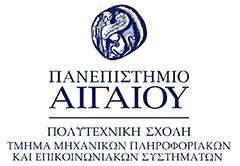Εκπαίδευση - Σπουδές
- Υποψήφιος διδάκτορας Πανεπιστήμιο Αιγαίου: Πολυτεχνική Σχολή Πληροφοριακών & Επικοινωνιακών Συστημάτων [2023 - Σήμερα]
- Δίπλωμα Μεταπτυχιακών Σπουδών: Πολυτεχνική Σχολή Πληροφοριακών & Επικοινωνιακών Συστημάτων [2022]
Ερευνητικά Ενδιαφέροντα
Εφαρμογή μεθόδων μηχανικής και βαθιάς μάθησης σε κλινικά και ιατρικά δεδομένα, με έμφαση στη μηχανική χαρακτηριστικών, την πολυπαραμετρική ανάλυση και την ανάπτυξη αλγορίθμων για προγνωστικά και διαγνωστικά μοντέλα στην υγεία.
Διδασκαλία
Ακαδημαϊκός Υπότροφος στο Πανεπιστήμιο Αιγαίου (2025 – σήμερα)
Υποστήριξη στα εργαστήρια των μαθημάτων:
Δημοσιεύσεις σε Διεθνή Περιοδικά (Journals)
Copyright Notice: This material is presented to ensure timely dissemination of scholarly and technical work. Copyright and all rights therein are retained by authors or by other copyright holders. All persons copying this information are expected to adhere to the terms and constraints invoked by each author's copyright. In most cases, these works may not be reposted or mass reproduced without the explicit permission of the copyright holder.
Abstract
Background: Venous thromboembolism (VTE) is a chronic disorder with a significant health and economic burden. Several VTE-specific Clinical Prediction Models (CPMs) have been used to assist physicians in decision-making but have several limitations. This systematic review explores if machine learning (ML) can enhance CPMs by analyzing extensive patient data derived from electronic health records (EHRs). We aimed to explore ML-CPMs applications in VTE for risk stratification, outcome prediction, diagnosis, and treatment. Methods: Three databases were searched, PubMed, Google Scholar, and IEEE electronic library. Inclusion criteria focused on studies using structured data, excluding non-English publications, studies on non-humans, and certain data types such as natural language processing and image processing. Studies involving pregnant women, cancer patients, and children were also excluded. After excluding irrelevant studies, a total of 77 studies were included. Results: Most studies report that ML-CPMs outperformed traditional CPMs in terms of receiver operating area under the curve in the four clinical domains that were explored. However, the majority of the studies were retrospective, monocentric, and lacked detailed model architecture description and external validation, which are essential for quality audit. This review identified research gaps and highlighted challenges related to standardized reporting, reproducibility, and model comparison. Conclusion: ML-CPMs show promise in improving risk assessment and individualized treatment recommendations in VTE. Apparently, there is an urgent need for standardized reporting and methodology for ML models, external validation, prospective and real-world data studies, as well as interventional studies to evaluate the impact of AI in VTE.
Επιστημονικά Συνέδρια (Conferences)
Copyright Notice: This material is presented to ensure timely dissemination of scholarly and technical work. Copyright and all rights therein are retained by authors or by other copyright holders. All persons copying this information are expected to adhere to the terms and constraints invoked by each author's copyright. In most cases, these works may not be reposted or mass reproduced without the explicit permission of the copyright holder.
Abstract
On a daily basis, medical decisions play a key role in healthcare services and patient well-being. This study aims to develop and validate machine learning (ML) models to predict both length of stay (LOS) and mortality in critically-ill stroke patients using the clinical-laboratory data available during the first 48 hours from admission, as those can be retrieved from the electronic health record of a patient. For this purpose, we utilized the MIMIC-IV database extracting clinical, laboratory, and demographic data. To capture time changes we grouped data in three-hour over-lapping observation windows for the first 48 hours of the patient’s stay in the Intensive Care Unit (ICU). The results obtained indicate that the root mean square error and the mean absolute error ranged from 1.35 to 2.07 days and 1.04 to 1.5 days, respectively for LOS and Area Under the Curve between 0.802 and 0.819 for mortality. This study highlights the importance of using ML techniques for predictions in the ICU, for patients suffering from stroke. The experimental evaluation demonstrated the significant potential of the XGBoost model in predicting both LOS and mortality, demonstrating the potential for efficient resource allocation and patient management. Our findings can contribute to optimizing clinical decision-making processes and to the overall improvement of quality of care in intensive care environments by providing personalized treatment and care based on the intended outcome.
Abstract
Ischemic stroke is a medical emergency that requires hospitalization and occasionally, specialized care at the Intensive Care Unit. Mortality prediction in the ICUs has been a challenge for intensivists, since prompt identification could impact medical clinical practices and allow efficient allocation of health resources in the ICUs, which are extremely restricted, especially in the era of COVID-19 pandemic. Clinical decision support systems based on machine learning algorithms are taking advantage of the vast amount of information available in the ICUs and are becoming popular in the medical predictive analysis. This study aims to explore the feasibility of interpretable machine learning models to predict mortality in critically-ill patients suffering from stroke. To do so, a vast variety of clinical and laboratory information stored in the electronic health record, are pre-processed to allow taking into account the temporal characteristics of a patient’s stay. An 8-hour sliding observation window was utilized. For the experimental evaluation we used the Medical Information Mart for Intensive Care Database (MIMIC-IV). Results indicate sufficient ability to predict mortality at the end of a given day during the patient’s stay. Moreover, attribute evaluation highlights the important indicators to consider when following up with a patient.
Βιβλία
Copyright Notice: This material is presented to ensure timely dissemination of scholarly and technical work. Copyright and all rights therein are retained by authors or by other copyright holders. All persons copying this information are expected to adhere to the terms and constraints invoked by each author's copyright. In most cases, these works may not be reposted or mass reproduced without the explicit permission of the copyright holder.
Κεφάλαια σε Βιβλία
Copyright Notice: This material is presented to ensure timely dissemination of scholarly and technical work. Copyright and all rights therein are retained by authors or by other copyright holders. All persons copying this information are expected to adhere to the terms and constraints invoked by each author's copyright. In most cases, these works may not be reposted or mass reproduced without the explicit permission of the copyright holder.
Επιμέλεια Πρακτικών Διεθνών Συνεδρίων
Copyright Notice: This material is presented to ensure timely dissemination of scholarly and technical work. Copyright and all rights therein are retained by authors or by other copyright holders. All persons copying this information are expected to adhere to the terms and constraints invoked by each author's copyright. In most cases, these works may not be reposted or mass reproduced without the explicit permission of the copyright holder.




